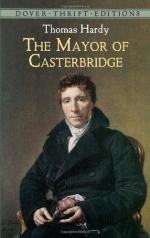“Just ask her,” said Nance, folding her naked arms in such a manner that she could comfortably scratch her elbows.
Henchard glanced at Elizabeth-Jane, whose complexion, now pink and white from confinement, lost nearly all of the former colour. “What does this mean?” he said to her. “Anything or nothing?”
“It is true,” said Elizabeth-Jane. “But it was only—”
“Did you do it, or didn’t you? Where was it?”
“At the Three Mariners; one evening for a little while, when we were staying there.”
Nance glanced triumphantly at Henchard, and sailed into the barn; for assuming that she was to be discharged on the instant she had resolved to make the most of her victory. Henchard, however, said nothing about discharging her. Unduly sensitive on such points by reason of his own past, he had the look of one completely ground down to the last indignity. Elizabeth followed him to the house like a culprit; but when she got inside she could not see him. Nor did she see him again that day.
Convinced of the scathing damage to his local repute and position that must have been caused by such a fact, though it had never before reached his own ears, Henchard showed a positive distaste for the presence of this girl not his own, whenever he encountered her. He mostly dined with the farmers at the market-room of one of the two chief hotels, leaving her in utter solitude. Could he have seen how she made use of those silent hours he might have found reason to reserve his judgment on her quality. She read and took notes incessantly, mastering facts with painful laboriousness, but never flinching from her self-imposed task. She began the study of Latin, incited by the Roman characteristics of the town she lived in. “If I am not well-informed it shall be by no fault of my own,” she would say to herself through the tears that would occasionally glide down her peachy cheeks when she was fairly baffled by the portentous obscurity of many of these educational works.
Thus she lived on, a dumb, deep-feeling, great-eyed creature, construed by not a single contiguous being; quenching with patient fortitude her incipient interest in Farfrae, because it seemed to be one-sided, unmaidenly, and unwise. True, that for reasons best known to herself, she had, since Farfrae’s dismissal, shifted her quarters from the back room affording a view of the yard (which she had occupied with such zest) to a front chamber overlooking the street; but as for the young man, whenever he passed the house he seldom or never turned his head.
Winter had almost come, and unsettled weather made her still more dependent upon indoor resources. But there were certain early winter days in Casterbridge—days of firmamental exhaustion which followed angry south-westerly tempests—when, if the sun shone, the air was like velvet. She seized on these days for her periodical visits to the spot where her mother lay buried—the still-used burial-ground of the old Roman-British city, whose curious feature was this, its continuity as a place of sepulture. Mrs. Henchard’s dust mingled with the dust of women who lay ornamented with glass hair-pins and amber necklaces, and men who held in their mouths coins of Hadrian, Posthumus, and the Constantines.




